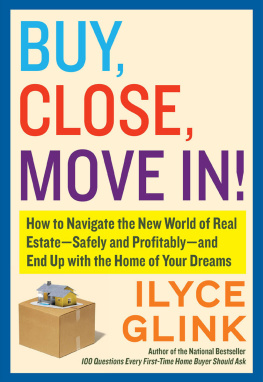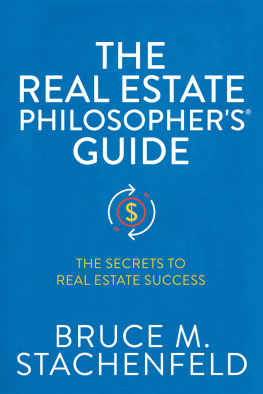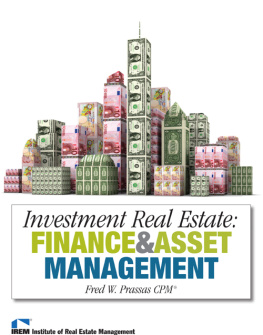NEXT GENERATION
 REAL ESTATE
REAL ESTATE
NEXT GENERATION

REAL ESTATE

NEW RULES FOR SMARTER HOME BUYING & FASTER SELLING
BRENDON J. DESIMONE

The advice and information contained in this book is for informational purposes only. The strategies presented in this book are based upon the research and experiences of the author in his many years as a real estate professional. Should the reader have any questions about how to proceed with a real estate matter, the author and publisher strongly suggest consulting appropriate professionals in the fields of law, real estate, and finance.
Changing Lives Press
50 Public Square #1600
Cleveland, OH 44113
www.changinglivespress.com
Library of Congress Cataloging-in-Publication Data is available through the Library of Congress.
Copyright 2014 by Brendon J. DeSimone
ISBN: 978-0-9849400-5-9
All rights reserved. No part of this publication may be reproduced, stored in a retrieval system, or transmitted, in any form or by any means, electronic, mechanical, photocopying, recording, or otherwise, without the prior written permission of the copyright owner.
Editor: Michele Matrisciani www.bookchic.net
Project editor: Carol Killman Rosenberg www.carolkillmanrosenberg.com
Cover designer: Roman Pietrs www.globalpopstar.com
Interior designer: Gary A. Rosenberg www.thebookcouple.com
Printed in the United States of America
10 9 8 7 6 5 4 3 2 1
Contents
Appendix
Real Estate Technology Companies and Services
INTRODUCTION
My Message
M y name is Brendon DeSimone. In 2004, after actively selling real estate in California for three years, I decided it was my turn to join the ranks of other single 30-somethings who were finally dipping their toes in the pool of adulthood: homeownership. Id been guiding clients through the home-buying process, and I thought it was only appropriate that I become a homeowner myself. Renting seemed foolish for someone in my profession, especially given the real estate market at the time. Things were moving fast. It seemed like everyone was getting in and making a quick buck. Id experienced a similar phenomenon a few years earlier working in Silicon Valley before, during, and after the dot-com bust. Then, it seemed as though everyone was working for a new start-up; ideas and subsequent business plans were flying, as were the stock options offered to the young entrepreneurial idealists heading for gold in California. Surely, Id take advantage of another boom.
Single, with no immediate plans for a family, I set pen to paper to sign the contract for a two-bedroom fixer-upper in the heart of San Francisco. My stomach dropped, and I had some apprehension. Wait, is this the right time to buy? Did I see enough properties? Am I overpaying? Is this the best location for me? Can I really afford this home? What if the market crashes?
Then, the inevitable question: What would my dad say?
I called my dad, and he listened to my trepidations as I ran down my laundry list of what-ifs and responded with, Whats the rate on a 30-year fixed?
What a bizarre thing to ask, I thought. Not one of my buyer clients had taken out a 30-year mortgage. Everyone was purchasing homes with five-year, fixed-rate, interest-only loans. A 30-year fixed seemed as obsolete as a rotary telephone or a television antenna. His question led me to dismiss him as out of touch with my lifestyle, my needs, and my prioritiesmy entire generations way of life! I was in California. This was 2004.
He was a baby boomer, whereas I was a high-tech boom of Silicon Valley. I worked insane hours at a software start-up before embarking on my second career as a real estate agent at an exciting time in real estate. I surely knew more than he did. Didnt my father realize that I didnt know where I would be in five yearsmuch less 30! Travel and mobility were high on my priority list. I was buying a fixer-upper and was already seeing similar renovated apartments selling for a lot more money than mine cost, so maybe Id just flip it and move on to the next project. Or maybe Id move back to the East Coast. I didnt know what was in my future.
All I knew was that the interest rate for a 30-year fixed loan, and therefore my monthly payment, was considerably higher in 2004 than most other types of mortgages. The thought of committing 30 years to my first home seemed ridiculous. I was moving fast; we all were. People overbid on homes, and sellers often received multiple offers. Properties appreciated 10 percent a year (or more), and there didnt appear to be any limits. It was the Wild West, and we were blazing trails.
Real estate, once synonymous with terms such as settling down and planting roots, was replaced with an ease in snatching up a property, getting a cheap bank loan, or flipping a shack. This created a whimsical climate in which there was no focus on the long termjust an American dream for the taking. This was the world as I knew it. Absent a larger life experience, I didnt have any sort of frame of reference.
Conversely, when my father was my age some 30 years earlier, he and my mother already had three kids under the age of 10. He was building a thriving small business and was focused on supporting his family. When he bought a home, he took into account the community in which the house was located, the school districts reputation, and how far he was willing to commute to work. He viewed homeownership as having two purposes: the starter home and the home to die in. In that context, why would he consider anything but a 30-year fixed mortgage?
My fathers inquiry about the mortgage rate wasnt about his cluelessness after all; rather, it pointed to a generational shift in real estate, and as I explored the causes for the disconnect, I discovered they went far beyond personal economics. For decades, buying and selling a home was pretty much the same: You stayed close to home, bought something you could afford, and aimed to own full-out by retirement age. However, that was real estate then, and this is now.
The years that followed my dads first home purchase have been jammed with upswings, downturns, housing style changes, demographic shifts, and of course the huge onslaught of technology. The Internet has changed everything, including how consumers choose properties, how they choose an agent, and how they know what we can afford. The efficiencies created by technology have changed our lives forever.
As I balked at my fathers antiquated mind-set, I signed the paperwork for a three-year, interest-only loan with ambitions to fix up the house and sell it before the rates ballooned. I was building a successful real estate practice and was on the front lines. But time flew faster than I expected, and by the time Id made my mark on the San Francisco real estate market, it was the fall of 2008. My personal Western was taken over by a horror flick in the form of a real estate market crash. By late 2008 the bubble had officially burst. Clients who needed to relocate with their companies, wanted to have another baby, or hoped to start renovating that fixer-upper found themselves stuck in their homes, unable to sell or refinance because their mortgage was underwater.
Next page









 REAL ESTATE
REAL ESTATE